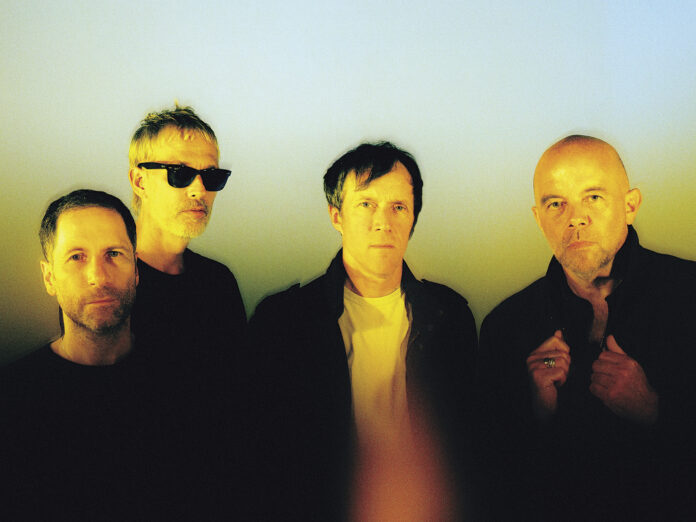Bliss it was to be alive in 1990, but to be young was very heaven. When Ride first stormed out of the gates in that shoegaze spring, they had an irresistible coltish energy to them. The presiding eminences of the time (My Bloody Valentine, Sonic Youth, House Of Love and The Stone Roses) had all already been around the block a few times, and made their youthful missteps away from the public eye. But the Oxford four-piece emerged blinking into the immediate glare of public acclaim, knocking out immaculate EP after EP like a teenage Robbie Fowler racking up the hat-tricks. No second thoughts, no calculation, just the sheer thrill of a moment they seized quite brilliantly.
Bliss it was to be alive in 1990, but to be young was very heaven. When Ride first stormed out of the gates in that shoegaze spring, they had an irresistible coltish energy to them. The presiding eminences of the time (My Bloody Valentine, Sonic Youth, House Of Love and The Stone Roses) had all already been around the block a few times, and made their youthful missteps away from the public eye. But the Oxford four-piece emerged blinking into the immediate glare of public acclaim, knocking out immaculate EP after EP like a teenage Robbie Fowler racking up the hat-tricks. No second thoughts, no calculation, just the sheer thrill of a moment they seized quite brilliantly.
DAVID BOWIE IS ON THE COVER OF THE LATEST UNCUT – ORDER YOUR COPY HERE
Did the immediacy of the rise overwhelm them? In retrospect they seem like a classic case of a band that stalled on The Difficult Third Album. They were keen to move on from the movement that threatened to define them (driving “Leave Them All Behind” into the Top 10 was a swaggering statement of intent), uncertain of exactly where to chart their course, and swept up in the gathering Oasis storm that briefly raised and then capsized their label.
Thirty years later, Ride are undoubtedly on a more even keel. Since the reunion in 2014 they’ve successfully launched two well-received albums, reconnected with a burgeoning audience and stylishly updated their signature sound without pandering to the whims of TikTok. But is a third album any easier the second time around? Is the point of the band – nostalgia fix for the festival circuit, or more urgent, ongoing artistic concern – still at stake?
What’s clear is that, in contrast to 1994’s Carnival Of Light, Ride are very much on the same page. From its title on, Interplay reminds us that they were always a terrific, a four-piece without any dead wood. Not only did they have fringes, tunes and chops of Mark Gardener and Andy Bell (Andy serving time as the bassist in Oasis, although presumably welcomed by his bank manager, still feels like something of a musical indignity, like a Grand National winner giving rides to kids on Skegness beach). But in Steve Queralt and Loz Colbert they had a genuinely useful rhythm section. You can count the number of distinctive British indie drummers on the fingers of one hand, but from the moment they released “Dreams Burn Down” it was clear that Loz was in that company.
It kicks off with “Peace Sign”, quite shamelessly aimed at the festival moshpits. Just as The Byrds were able to make Dylan palatable for Top 40 radio, Ride were somehow able to translate the sublime roar of My Bloody Valentine into toothsome pop songs (they can still pull it off as they show on the delicious “Portland Rocks”). Here it feels like they’ve perfected the same trick for The War On Drugs. It’s quite a trick, somehow distilling all the epic yearning of an Adam Granduciel album into a pealing, effervescent four-minute anthem.
For the rest of Interplay, Ride are very much searching for The Big Sound, a kind of widescreen ’80s ambition they were too indie cool to acknowledge back when they started out. They’ve talked about the example of Tears For Fears and the U2 of The Unforgettable Fire. But there’s a hefty amount of New Order (the touching, twangling “Last Frontier”) and Depeche Mode (on the hurtling “I Came To See The Wreck”) in there too, as though Ride are deliberately drawing upon bands who’ve shown how it’s possible to mature and thrive into their fourth and even fifth decades together.
The heart of the record, sequenced as though to open Side Two of a vinyl album, is “Last Night I Went Somewhere To Dream”. It’s a tune that began as an almost throwaway Loz riff, but grew into what feels like a manifesto for the reborn band, a twangling wide-eyed psychedelic reel. The lyrics – always, to be fair, the band’s Achilles’ heel – talk of “the wheel of suffering” turning “with diminishing returns”, but there’s such an unaffected earnest joy in the singing and playing, its reminiscent of The Byrds’ “Going Back”, a heartfelt invocation of uncontrived innocence.
The album closes with “Yesterday Is Only A Song”, a kind of soft and dreamy Pink Floyd coda, except with all the quiet desperation and bitterness replaced with a hard-won acceptance and even optimism. Here and on the best tunes of Interplay, Ride feel wonderfully, unexpectedly, younger than yesterday.



